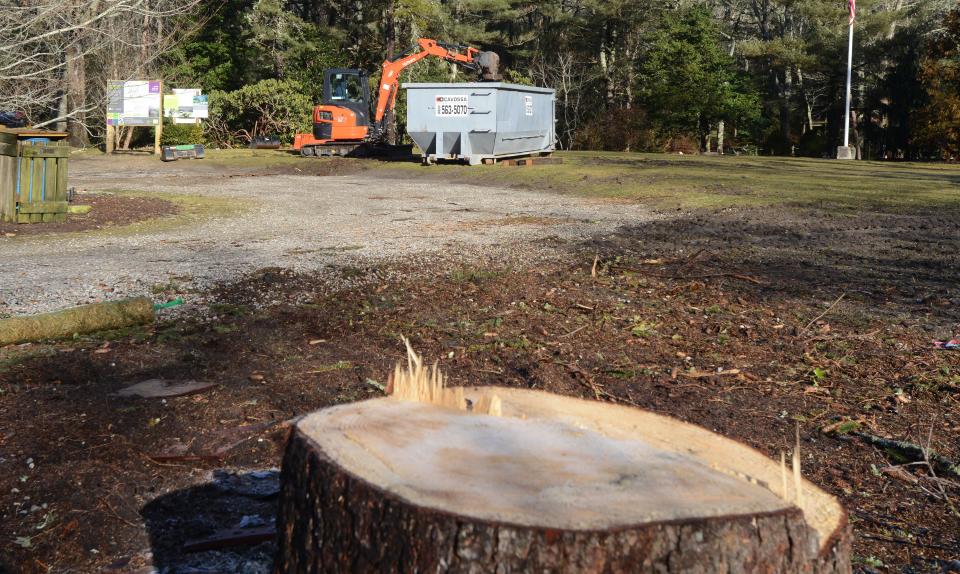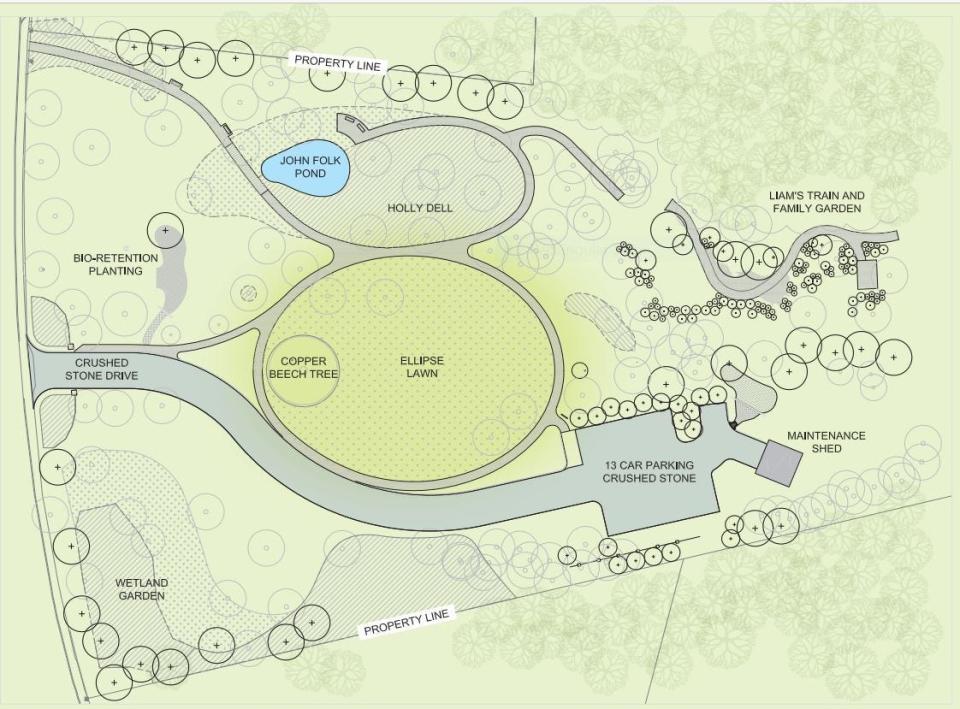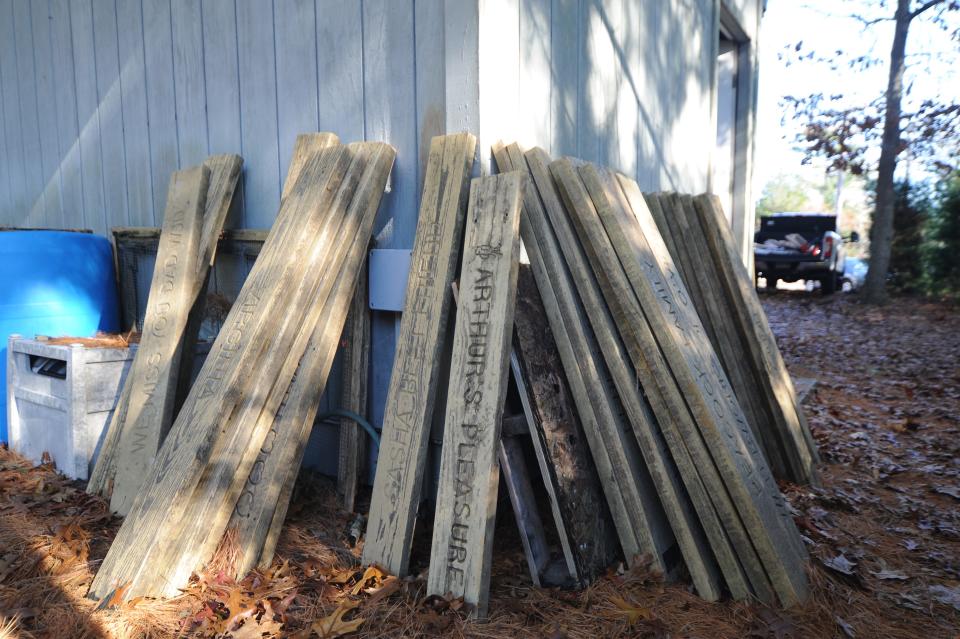Whimsical, leafy park in Osterville is closed for now. Here's why
EDITOR'S NOTE: This story was edited March 3, 2023, to note that the deadline has passed for donors to request memorial boards removed as part of the renovations at Armstrong-Kelley Park.
For the first time in nearly 100 years, Armstrong-Kelley Park — a garden getaway tucked away off Main Street between Tower Hill Road and Old Mill Road in Osterville — is closed.
But not to worry, the closure is only temporary. Those who enjoy the park's softly undulating trails, and its natural sights and sounds, will be able to resume their visits later this spring, just as the blossoms are blowing, the leaves are starting to darken to summer green, and the birds are welcoming new broods. And the best part? The garden, which is maintained by the Trustees of Reservations, will be better than ever, spruced up and more accessible, with more beauties to discover.

What is Armstrong-Kelley Park?
An 8.5-acre property described by the Trustees as a "woodland oasis," Armstrong-Kelley Park is Cape Cod's oldest and largest privately owned public park. It is at 675 Main St. in Osterville.
The park was previously maintained by the Cape Cod Horticultural Society, and was taken under the Trustees' wing in 2021 as one of the organization's nature reservations and its 12th public garden. It features many rare and unusual trees, including a Franklin tree — a flowering tree in the tea family, now considered extinct in the wild, that was named for Benjamin Franklin. There are also more than 200 rhododendron and azalea plants, a dell with many varieties of holly, a water garden with a goldfish pond, a certified wetland, trails, a wooden train engine for children (Liam's Train), and picnic tables.
Normally open year-round, daily from sunrise to sunset, the park offers also educational activities throughout the year. Admission is free.
Forever preserved by the TrusteesPreserved 'forever': Cape Cod’s oldest and largest privately-owned public park has a new owner
What is happening?
For the next several weeks, the park is undergoing extensive improvements.
"We've been planning this for three years. It's so exciting," said Anne Smith-White, director of the Trustees' South Shore Portfolio that includes Armstrong-Kelley Park.
Work includes some tree removal to prepare the site for new circulation pathways compliant with the Americans with Disabilities Act — an effort to make the park more accessible to everyone. Also planned is a new car park set farther back on the property, out of sight of Main Street, Smith-White said, in addition to a new driveway.
"We'll also be creating a new gathering green and expanding the fish pond," she said.
The pond has been home to goldfish, which are presently rehomed but are expected to be returned to the park once the project is complete. Additionally, the project includes installation of stormwater management structures and a storage shed.

On top of all of that, there are horticultural improvements in the works, too, including refreshing the plantings at the park's entrance, diversifying the tree and shrub collections and enhancing the year-round beauty with trees, shrubs and flowers that will each have a turn at showing off with the changing of the seasons. For example, for spring there will be bulb flowers like narcissus, squills, snowdrops, and tulips; and perennials like phlox and iris. Summer will bring flowers like echinacea, stachys and helenium; fall will feature perennials like asters and goldenrod, and winter will showcase plantings like winterberry, hollies, and heathers.
"So much effort and planning is going into the new horticultural aspect of the garden, with beautiful beds of perennials and annuals, lots of investment into shrubs and ornamental trees — really making this park into a destination for gardeners who want to see interesting cultivars," Smith-White said.
Plans also call for adding screening in key locations, and continuing to add native wetland plants to the wetland area along Main Street. And Liam's Train, dedicated in 2005 to the memory 2-year-old Liam O'Neil, will get refurbished.
"It's getting up there in years, so it's going to be completely rehabbed and replaced back into the park," said Smith-White.
About Liam and the trainKeeping alive Liam's joy of living
The Trustees are also working with the Barnstable Community Preservation Committee on an expanded family garden at the park, which Smith-White said "will have all kinds of natural play places, to climb, scrabble and build." Liam's Train will be the focal point of the garden.
What about the memorial board walkways?
As part of the improvement project, the boardwalk system in the park will be completely revamped. This means taking out the 1,500 inscribed memorial boards that have been there for at least two decades and replacing them with stone dust pathways more easily navigated by people with strollers, walkers and wheelchairs.
Smith-White said the inscribed memorial boards were sold as part of a fundraiser and incorporated into the boardwalks. But the boards deteriorated over time. They were also very narrow, and were too high to be easily accessible.

"The older sections of the boardwalk, especially those by the holly dell and the fish pond, were shady. Those boards have been rotting, and they're slippery. We've been having to pull them out and replace them," she explained.
Those memorialized by the boards will not be forgotten, though.
"Their names are still represented," Smith-White said, explaining all of the names will be inscribed on the back of a new kiosk that will be on the property after the renovation. The front will feature a map.
The Trustees have reached out to the community over the last couple of months to offer donors an opportunity to retrieve their boards, and were able to connect with roughly 300 people who have come to claim them. The deadline to request boards to be reserved passed on March 1.
When will the park reopen?
The park was officially closed to the public on March 1, and its entrance fenced off as construction began in earnest. Smith-White said it will remain closed for about three months.
"We're hoping it will be done by late May, early June," she said.
The park is frequently visited by people in the neighborhood who enjoy walking their dogs there, she said. It also attracts many families, who enjoy exploring the trails, visiting the fish pond and playing on Liam's Train.
"There are also a lot of older people," Smith-White said, including a group of older gentlemen who come weekly, in fair weather, to enjoy a picnic breakfast and conversation.
What is the history of the park?
The Cape Cod Horticultural Society owned and operated Armstrong-Kelley Park from 1930, when the land was donated by its patrons, Mrs. Marion (Seaverns Williams) Kelley, and Mrs. Mary Martha (Armstrong) McClary. Cecil I. Goodspeed made an additional gift of adjoining parcels in 1937, thus totaling the park's 8.5 acres, according to Smith-White.
Up until incorporating with the Trustees in October 2021, the park was run by the Horticultural Society, a group of "very dedicated volunteers" who cared for the park, fed the fish, and organized community programs.
"About five years ago they decided they needed to find a new caretaker for the park because it was too big a project for them," she said.
Who are the Trustees of Reservations?
The Trustees of Reservations is the nation's first, and the state's largest, nonprofit preservation and conservation organization, founded in 1891 by landscape architect Charles Eliot, maintaining landscapes and landmarks. It maintains more than 100 reservations across Massachusetts, comprising almost 27,000 acres.
According to the organization, more than two million people visit its reservations annually. Additionally, 250,000 people participate in its more than 5,000 programs and events, and volunteers contribute more than 50,000 hours of assistance in all aspects of its work.
Gain access to premium Cape Cod Times content by subscribing.
This article originally appeared on Cape Cod Times: Osterville park with something for nearly everyone is closed for now

